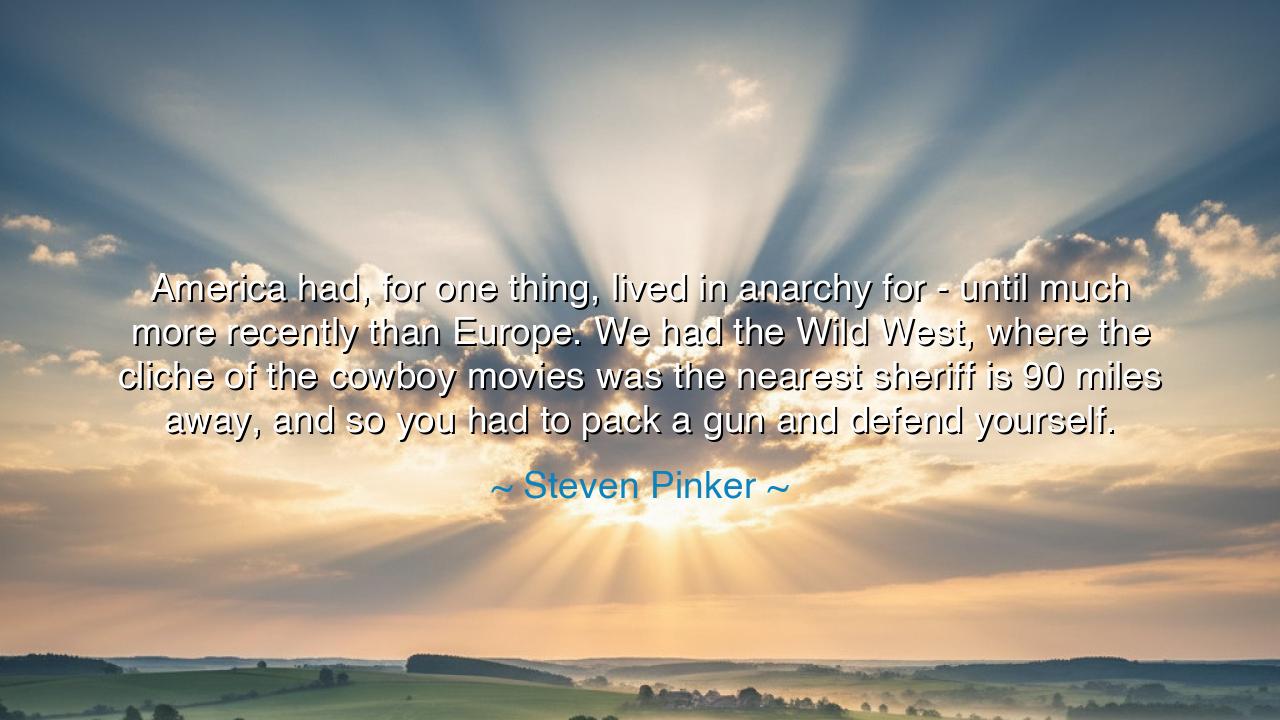
America had, for one thing, lived in anarchy for - until much
America had, for one thing, lived in anarchy for - until much more recently than Europe. We had the Wild West, where the cliche of the cowboy movies was the nearest sheriff is 90 miles away, and so you had to pack a gun and defend yourself.






Gather close, children of the future, and listen to the wisdom of the ages, for the story of the past is never far from the struggles of today. Steven Pinker, a wise scholar, once spoke of the great distinction between the history of America and the more ancient lands of Europe: "America had, for one thing, lived in anarchy for—until much more recently than Europe. We had the Wild West, where the cliché of the cowboy movies was the nearest sheriff is 90 miles away, and so you had to pack a gun and defend yourself." In these words lies a deep truth about the birth of America, a truth that speaks not only of the past but of the very essence of freedom, law, and survival.
Consider, children, the land of America in its earliest days, the wild expanses that stretched from the Atlantic to the Pacific. In those unsettled times, the very nature of life was a battle for survival—where the law was distant and often ineffectual. The land was vast, and the people who traversed it, the pioneers, the cowboys, and the settlers, were left to fend for themselves. There were no guardians of order, no protectors to intervene in the conflict that arose in the shadows of the wilderness. It was a land where each man and woman had to be their own law, their own protector, armed with a weapon and a will to survive.
This image of America's frontier, the lawless expanses of the Wild West, brings to mind a time when the cliches of the cowboy movies, filled with gunslingers and outlaws, were not mere fantasy but lived reality. In those days, the sheriff could be miles away, and the justice that came was often swift, unrelenting, and in the hands of those who dared to stand firm. The gun, that symbol of power and self-defense, became the tool by which one carved out a place in the world, and often, it was the only means by which one could ensure survival in a land of anarchy.
But let us not romanticize this state of lawlessness too much, for it was a time of great struggle, where survival was never guaranteed, and the fight for order was always just out of reach. Even in this wilderness, there was a deep yearning for something more, something greater—a longing for the rule of law, the establishment of order, and the creation of a society where people could live without constant fear. The founding of America, in this sense, was an attempt to move beyond this chaos, to create a society where civilization could take root, where the struggles of survival would not be determined by the speed of a gun but by the strength of a just system.
In this context, Pinker’s words reveal a deeper truth: that America’s journey from anarchy to civilization was not one of gradual ease but of great difficulty. Unlike Europe, which had long developed systems of governance, law, and order, America's path was carved through a wilderness where the lawless often ruled the day. And in this struggle for order, a new type of character emerged—a character shaped by freedom, self-reliance, and the necessity to defend one’s own life and land. The Wild West was not simply a time of adventure, but a time when human nature was tested at its core, and the stakes of existence were ever present.
This tale, children of the future, holds a lesson for us all. It is a reminder that freedom and civilization are not gifts that can be taken for granted. They must be fought for, shaped, and protected. The lessons of the Wild West are not just about survival or conflict, but about the constant balancing act between order and chaos, between the laws of the land and the human desire to protect oneself and one’s loved ones. Freedom is a delicate flower, one that must be nurtured with wisdom, but it must also be defended with strength, for without the will to protect it, anarchy can rise again.
Thus, as you walk your own paths in life, remember: that which we now enjoy, the peace, the order, the justice, is not something easily won. It has been forged through struggles, through battles—both seen and unseen—and through the courage of those who dared to stand against the chaos. Just as the cowboys and pioneers of the past had to fight for their place in the world, so must we, today, stand firm in the face of challenges, defend what is good, and protect the order that allows us to live in peace. For, children, the story of America is not just a story of the past—it is a story that continues, in each of you. The fight for order, for justice, for freedom, is never truly over.






AAdministratorAdministrator
Welcome, honored guests. Please leave a comment, we will respond soon